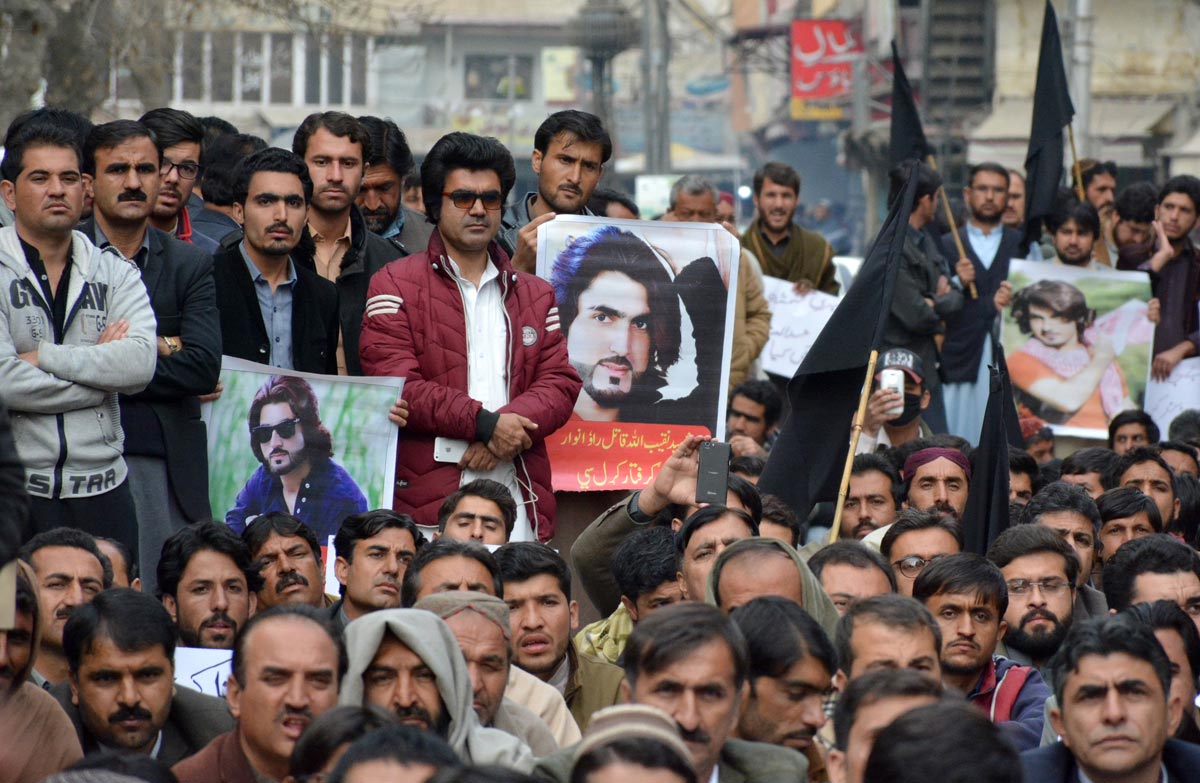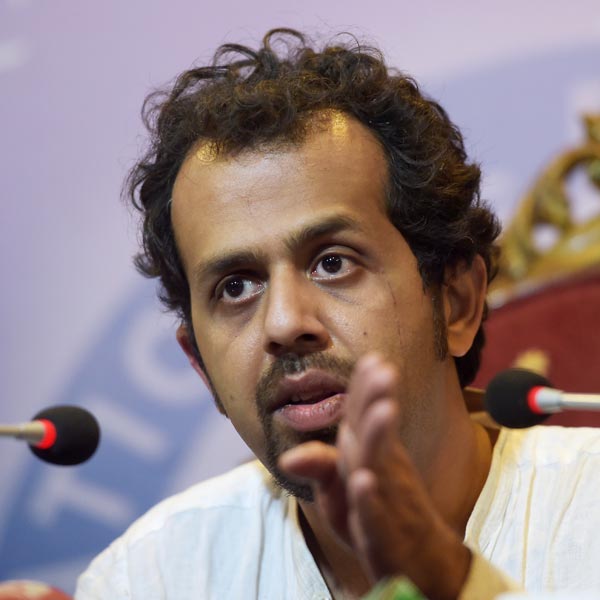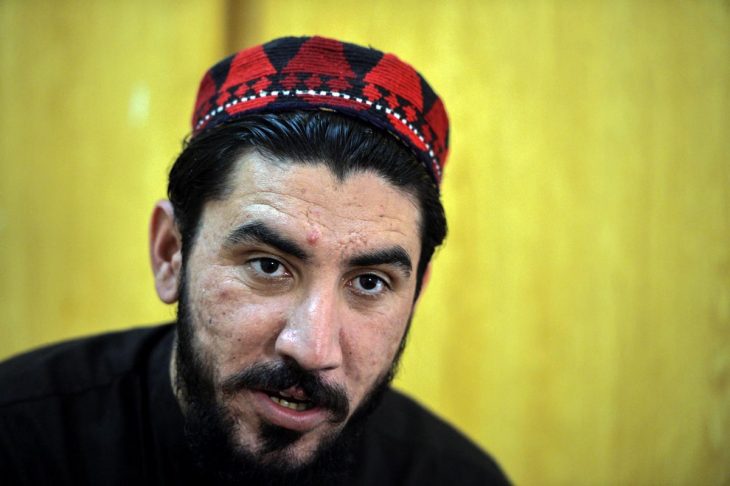JUSTICEINFO: Your movement, the PTM [for Pashtun Tahaffuz Movement - read below] has been carrying almost since its inception a demand for a truth and reconciliation commission on crimes committed against the Pashtuns in the tribal belt near Afghanistan, which you pleaded last April before senators. Why do you think such a commission can be the best solution to address the grievances of Pashtuns?
MANZOOR PASHTEEN: A truth commission will help bring out truth on what really happened in our area since 9/11. The Pakistani state has been claiming they were fighting a War on Terror. They claimed that they were conducting operations against the Taliban. But in reality, we saw the Taliban being brought and settled in our areas, where they were allowed to grow. Then we were told that the military will come and become our saviors. When the army came, they did conduct some operations – but none of the Taliban leadership was caught nor was killed. Instead they shifted to another place within the tribal belt. For example, they were in Wana, part of Waziristan. When the military came, they shifted from there to the Mehsud area, and when there was an operation there, then they shifted to Kurram. They kept shifting from an area to another as the military kept moving into our areas.
It felt like we were living in a movie, where the Taliban were the villain and the military the hero. You know it felt like a love story: the man wants to get a woman but there is a villain that he needs to defeat. This villain creates an interest in the story plot by making it difficult for the man to get the woman. Here, the woman was our resources that they wanted. And to take over those resources, they needed to create a hero and a villain narrative. But the rest of the world has been unable to understand all this. Our lands are rich with oil and gas, with different unique fruits, that are not found anywhere else in the country. Also, there is a huge narcotics trade. They want to control all these resources and do not want any Pashtuns questioning them over it.
The Taliban were a handful and yet they survived and escaped while hundreds of our people were killed. How is this possible?
Are the Pashtuns conscious of what happened?
Everyone, including the Pashtuns, have been kept in the dark. Terror attacks on us have been largely ignored by mainstream media in the country and they were not investigated at all. The world was told that the Pakistan army was fighting against terrorism. Of course, there was somewhat of a small conflict they were engaged in – but it was a really strange conflict. The Taliban were a handful and yet they survived and escaped while hundreds of our people were killed. How is this possible? And then the Taliban would also target civilians through suicide bombings. From both sides, we were the ones who were being killed. We need to investigate why.
The military then started to take over the local resources of the region and would not face any opposition from locals because they were posing as the saviors. Such practice is continuing today. Many of us have lost family members in this war. And when someone who has lost everything is depressed and disappointed and he criticizes the military over its failures, he is told not to question the military because it is so sacred. We even face government crackdown for being active on social media and speaking up about the abuses. People do not sympathize with us even though we are the victims. We need to end this hypocrisy.
How do you think a truth and reconciliation commission could collect evidence for all the allegations you are making?
We have been collecting evidence, as much as we can, but as you know, the conflict zones in our region are still being held hostage by the Pakistani military. Anyone who has tried to collect, investigate and document proofs has had to face threats, arrests and illegal detentions. For example, when [PTM activist] Alamzaib Mehsud documented how the people were affected by military-planted landmines in our area – he was arrested under fake charges and put in jail for ten months. Also, we have seen that anytime journalists, human rights organizations or any other observers want to visit our area, they are not allowed to come without being attached to the military. But if a truth and reconciliation commission is created, we can take it around our region. We will show them how terrorists continue to occupy this region despite the claims by the army, we will show them how the military conducted operations against ordinary citizens.
We want the commission to document war crimes that were carried out in the name of War on Terror.
What scope of mandate would you propose?
First of all, the commission should be comprised of local and international personalities who the war-torn people of the tribal belt can trust. Secondly, we want the commission to document war crimes that were carried out in the name of War on Terror. Since the war was funded by many Western countries, we need also to have transparency on where this money was actually spent. Then, we need to build a mechanism to compensate ordinary citizens who have lost their families, homes, businesses, livelihoods etc. The commission should also ascertain the number of missing persons, and why they have been taken away and were not given any due legal process. There have been a number of extra-judicial killings of Pashtuns in our region and we need to establish the truth about who was involved in that. The identities of these people should be made public. Finally, this commission will have to ensure that there is reconciliation between Pakistani state and the public. And all those countries who funded this war, they all need to apologize and reconcile with our people.
70,000 people have been killed out which 90% are Pashtuns. Everyone has lost a family member in our region.
Can it help avoiding a split from the Pashtuns in Pakistan?
There is still time to avoid such a split. But the polarization amongst our people has reached such a level that when the PTM wants to sit down for dialogue with the government, many of our followers become upset, saying “why should we sit down with those who have constantly deceived us!” In such an environment, the PTM is trying to keep the society together and is urging the state to go for the best option possible in the form of a truth and reconciliation commission, to restore the trust and the confidence we should have in the state as citizens of this country. Imagine, 70,000 people have been killed out which 90% are Pashtuns. Everyone has lost a family member in our region and has been directly affected by the war. These pains have created a lot of frustration and anger. The State thinks that our movement would fizzle out and do not seem interested in resolving our issues. They want the public to be remain quiet even if it feels oppressed, but that is no longer possible.
What other transitional justice efforts should be implemented?
Until now the military has been compensating some individuals, but only when they knew that they can pay up for them to shut up. But this is not what we want. We want a proper across-the-board compensation, and not a selective compensation. They destroyed a big market in our area that had 13.000 shops and reconstructed it with only 700 shops. They keep rubbing it in the face of the locals – ‘look we reconstructed your market’ – but many have lost their businesses as they were never compensated. We definitely do want fair judicial trials because we believe that it will be beneficial not only for us, but also for improving democracy in the country. Currently trials are only favoring the military. Every time we have approached the courts for relief, we have not gotten any. Instead, we have been harassed by the State.
Who in Pakistan supports this idea of a truth commission?
Everyone supports the idea of setting up a truth commission in our area, except those who were spying for the military, or were target-killers on behalf of the military. The Pakistan army and the Taliban do not want this commission. Some political groups who partnered with the military and made money with the War on Terror funding – they do not want this commission either. For the rest of the people, they all want it. Even mainstream political parties support it. Some members of the current government have supported us. Pakistan’s current minister for Human rights Shireen Mazari had tweeted in favor of our demand for a truth and reconciliation commission before she became the minister. But since, she deleted that tweet.
So many people are being killed, hundreds of us are protesting, and in many ways, humanity is under attack in our region and yet the world remains a silent spectator.
Will the government accept your demand?
I do not know if they will or not and I have no way to tell this, but I am quite surprised by the silence of world powers and the United Nations. So many people are being killed, hundreds of us are protesting, and in many ways, humanity is under attack in our region and yet the world remains a silent spectator. This is not the first time the UN is silent. It was silent when the Pakistan army killed thousands of Bengalis, and they have remained silent when the Baloch have been killed. When in reaction to these atrocities people picked up arms, they were quickly declared terrorists. When we protest in a non-violent way, then these strong organizations do not support those movements. I am not talking about my movement as we are peaceful, but such silence does not help promote peace. It aggravates the grievances and can lead to violence.
Until now, did you discuss it with the government?
Before the [July 2018] elections, we met with [Prime Minister] Imran Khan twice. He said, “when I am elected, the next day I will call upon you and resolve all your troubles, problems”. He sympathized with us and said that we had legitimate grievances. He said “the oppression you have faced by the military is worse than what Israel has done in Palestine. India has not even done so in Kashmir.” But we never heard about him once he took office.
PTM: FROM THE KILLING OF A YOUNG MAN TO A POPULAR MOVEMENT

From 2018 in Pakistan, a pacifist ethnic rights movement called the Pashtun Tahaffuz [for “protection”, in Urdu] Movement (PTM) has been gaining momentum. The second ethnic group in Pakistan, the Pashtuns counts around 25 million people and 15 % of Pakistan’s population. Most of them reside in the tribal belt areas, next to the Afghanistan border.
The PTM rose and became prominent after massive protests that gathered thousands of people in Islamabad city, to claim for an investigation into the extra judicial killing of Naqeebullah Mehsud, a 28-year-old Pashtun shopkeeper and aspiring model shot dead by police in the city of Karachi, on 13 January 2018. The police alleged he was a terrorist suspect, but the antiterrorism court cleared him of charges, a year after. The killing of Naqeebullah was extrajudicial, conclude a police enquiry. Despite these findings, the police commander who led the operation remains at large.
The initial protest to demand justice for Naqeebullah turned into a larger movement, the PTM, for the rights of Pashtuns, who have been victims of State and non-State violence since 9/11. The PTM became popular for it denounces widespread human rights abuses in military operations, which continue today, the missing of hundreds of Pashtuns, and the detention of many in secret jails run by the military without any judicial process.
The leader of the PTM movement, Manzoor Pashteen, hails from North Waziristan, the same area Naqeebullah was from.

TAHA SIDDIQUI
Taha Siddiqui is a Pakistani journalist living in exile in Paris, France. He is the founder of safenewsrooms.org, a digital media platform documenting censorship in Asia. While in Pakistan, Siddiqui reported for international news organizations, including the New York Times, the Guardian, Al Jazeera English, France24, Christian Science Monitor. His focus areas include terrorism, civil-military affairs and human rights. In 2014, he won the Prix Albert Londres for a documentary on the spread of poliomyelitis in Pakistan and Afghanistan. He went into exile with his family in February 2018 after surviving a kidnapping in Islamabad. The Pakistan Army had been threatening him for years for his reporting. He currently teaches journalism at SciencesPo and continues to write for leading international publications.



